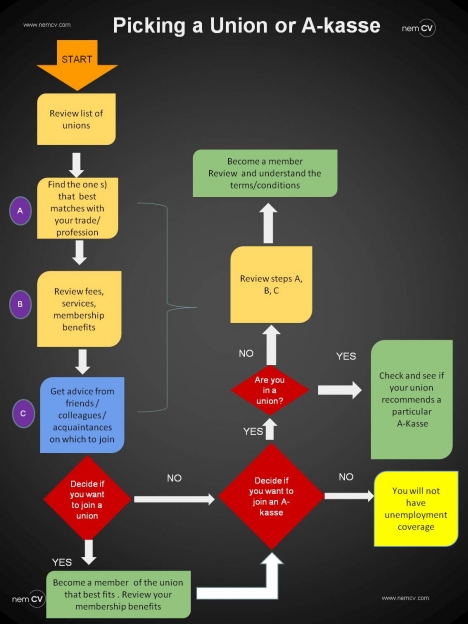Working in Denmark: Unions and A-kasse

Human resources expert Nancy Rasmussen gives an introduction to picking the union that is right for you and how to protect your finances through private unemployment insurance.
Editor's note: an updated version of this article can be found here.
So you’ve had your first day and you are settling into your new job, getting to know how things work with regard to your tasks and responsibilities. All is well, but then come some nagging thoughts. What if something goes wrong and I lose my job?
Fortunately, there are some things that you can do to be proactive about securing your finances in the event that you become unemployed. It’s important to note that these are things that you are responsible to arrange for yourself and you should not expect them to be part of your formal employment process.
Click image for larger version. Story continues below.
Unions
It is very common in Denmark for employees to join a union, even white collar employees and management. Unions offer a variety of services and support to their members, such as reviewing employment contracts, providing discounts on insurances and other products, and offering great networking opportunities. Unions are generally focused around a specific profession or trade.
It can be hard to know which union you should join, especially if you are new to the Danish labor market and aren’t able to read Danish. I found this handy list, but it is in Danish. The names of many of the unions themselves contain the profession that they are associated with, so you may want to ask a Danish friend for help or run the list through your preferred translation website.
Many of the unions have websites with a section in English, which give a description of the types of professions that they cover. A handful of them are also multidisciplinary. If you are still unsure of which to pick, you can always ask your coworkers for advice, especially those that are in the same profession or trade.
A-kasse
It is also very common and highly recommended for employees to join an A-kasse (arbejdsløshedskasse), which are private organizations that provide unemployment insurance. If you become a member of a union, they will often times recommend a certain A-Kasse and may offer a deal to join. However, you can join an A-kasse without becoming a member of a union.
It can also be difficult to figure out which A-kasse to join and while some are cheaper than others, it’s not just about paying an insurance premium. It’s a good idea to find an A-kasse that also fits well with your profession or trade. In the event that you become unemployed, it’s good to have an A-kasse that is an appropriate fit for your background, so that they can better help you with your plan to get back into the workforce.
There are a lot of rules that you’ll have to familiarize yourself with, including when you will be allowed to apply for benefits and how long you can receive them. For example, you generally have to be a member of the A-kasse for a year before being able to apply for benefits. You also have to have worked for a certain period of time within the last three years, which varies depending on whether you were insured as full-time or part-time. If you decide to quit your job yourself, then there will be a waiting period in which you will not eligible to receive benefits. These are just some examples of the rules. All of terms and conditions will be available from your A-kasse, so be sure to review everything carefully.
There is a cap to on the amount you can receive, so you are not automatically covered for your whole salary. You can check if your A-kasse offers a supplemental insurance plan, which you have to pay into for a certain amount of time before you become unemployed, in order to get the additional benefits.
There may also be other great membership benefits from your A-kasse that you can use even while employed. Some offer additional packages for legal advice, which can be helpful if you don’t join a union. There could also be networking opportunities or workshops/webinars that you can participate in, which can help strengthen your overall profile.
What do you want to hear about in my next article? Let us know!
 Nancy Rasmussen is currently employed as a Change Management Consultant, supporting IT projects. She has more than 12 years of experience within large, international companies. She writes this column in her free-time in connection with NemCV. This column is not affiliated with her current full-time employment.
Nancy Rasmussen is currently employed as a Change Management Consultant, supporting IT projects. She has more than 12 years of experience within large, international companies. She writes this column in her free-time in connection with NemCV. This column is not affiliated with her current full-time employment.
Comments
See Also
Editor's note: an updated version of this article can be found here.
So you’ve had your first day and you are settling into your new job, getting to know how things work with regard to your tasks and responsibilities. All is well, but then come some nagging thoughts. What if something goes wrong and I lose my job?
Fortunately, there are some things that you can do to be proactive about securing your finances in the event that you become unemployed. It’s important to note that these are things that you are responsible to arrange for yourself and you should not expect them to be part of your formal employment process.
Click image for larger version. Story continues below.
Unions
It is very common in Denmark for employees to join a union, even white collar employees and management. Unions offer a variety of services and support to their members, such as reviewing employment contracts, providing discounts on insurances and other products, and offering great networking opportunities. Unions are generally focused around a specific profession or trade.
It can be hard to know which union you should join, especially if you are new to the Danish labor market and aren’t able to read Danish. I found this handy list, but it is in Danish. The names of many of the unions themselves contain the profession that they are associated with, so you may want to ask a Danish friend for help or run the list through your preferred translation website.
Many of the unions have websites with a section in English, which give a description of the types of professions that they cover. A handful of them are also multidisciplinary. If you are still unsure of which to pick, you can always ask your coworkers for advice, especially those that are in the same profession or trade.
A-kasse
It is also very common and highly recommended for employees to join an A-kasse (arbejdsløshedskasse), which are private organizations that provide unemployment insurance. If you become a member of a union, they will often times recommend a certain A-Kasse and may offer a deal to join. However, you can join an A-kasse without becoming a member of a union.
It can also be difficult to figure out which A-kasse to join and while some are cheaper than others, it’s not just about paying an insurance premium. It’s a good idea to find an A-kasse that also fits well with your profession or trade. In the event that you become unemployed, it’s good to have an A-kasse that is an appropriate fit for your background, so that they can better help you with your plan to get back into the workforce.
There are a lot of rules that you’ll have to familiarize yourself with, including when you will be allowed to apply for benefits and how long you can receive them. For example, you generally have to be a member of the A-kasse for a year before being able to apply for benefits. You also have to have worked for a certain period of time within the last three years, which varies depending on whether you were insured as full-time or part-time. If you decide to quit your job yourself, then there will be a waiting period in which you will not eligible to receive benefits. These are just some examples of the rules. All of terms and conditions will be available from your A-kasse, so be sure to review everything carefully.
There is a cap to on the amount you can receive, so you are not automatically covered for your whole salary. You can check if your A-kasse offers a supplemental insurance plan, which you have to pay into for a certain amount of time before you become unemployed, in order to get the additional benefits.
There may also be other great membership benefits from your A-kasse that you can use even while employed. Some offer additional packages for legal advice, which can be helpful if you don’t join a union. There could also be networking opportunities or workshops/webinars that you can participate in, which can help strengthen your overall profile.
What do you want to hear about in my next article? Let us know!
 Nancy Rasmussen is currently employed as a Change Management Consultant, supporting IT projects. She has more than 12 years of experience within large, international companies. She writes this column in her free-time in connection with NemCV. This column is not affiliated with her current full-time employment.
Nancy Rasmussen is currently employed as a Change Management Consultant, supporting IT projects. She has more than 12 years of experience within large, international companies. She writes this column in her free-time in connection with NemCV. This column is not affiliated with her current full-time employment. 
Join the conversation in our comments section below. Share your own views and experience and if you have a question or suggestion for our journalists then email us at [email protected].
Please keep comments civil, constructive and on topic – and make sure to read our terms of use before getting involved.
Please log in here to leave a comment.